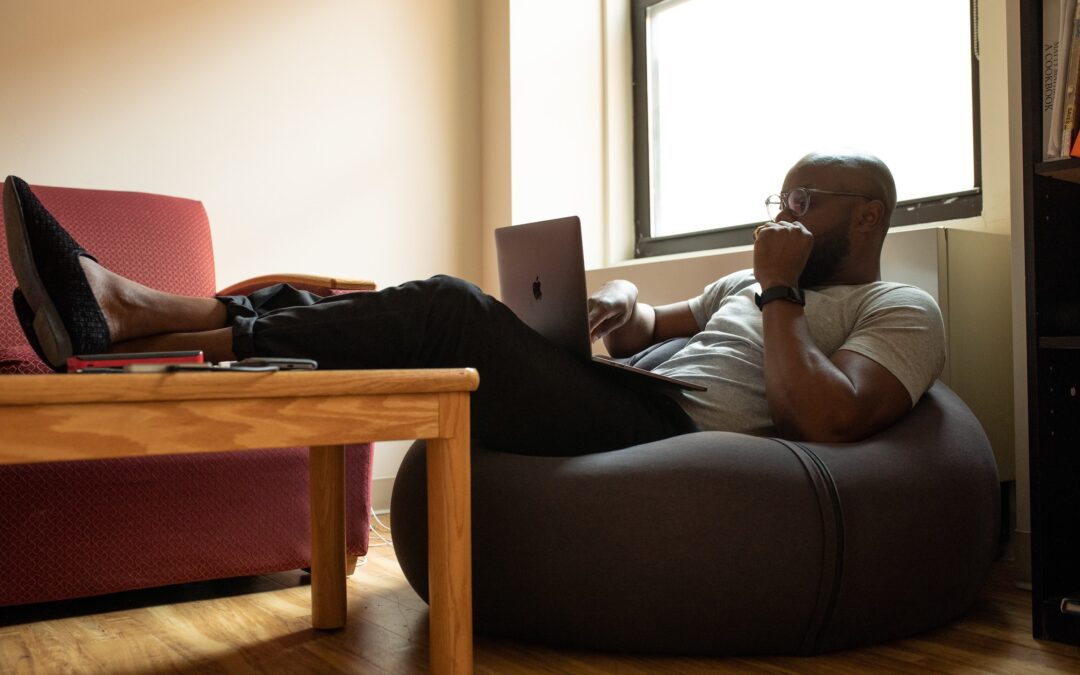This week we’re talking about the impact of poor posture on our health and wellbeing.
I think it’s especially important to shed light on this topic because so many people are now working from home either part or full-time, but how many have a good desk set-up? How many people are using a proper ergonomic chair at their desks? And how many are spending time working from a laptop while sitting on the sofa or in bed?
The point is, there’s more risk of people sitting in a slouched/slumped position while WFH, which can impact far more than just our bodily alignment:
Compromises the nervous system
Poor posture increases physical stress on the body and more specifically the spine, which, along with the brain, is the core of our nervous system. Anything that stresses the nervous system also compromises every other system in our body.
Our nervous system controls our metabolism, hormones, heart rate, immune system, and organ function.
When our nervous system is compromised due to poor posture and poor bodily alignment, every system in the body can suffer as a result…
Contributes to anxiety & depression
Our brain is constantly responding to the position of our body and vice versa. If we are stressed or anxious, we will typically raise our shoulders and hunch forward a little depending on the severity of the stress.
This is why ‘power poses’ are a thing – you make yourself feel more confident by standing tall, upright, chest open and shoulders back.
It works both ways. This means if we slouch and maintain a poor posture it has the opposite effect on our mood.
Impacts our self-confidence
Having a tall and upright posture also has a direct influence on how other people perceive you. As humans, we are constantly subconsciously picking up on people’s facial expressions, mannerisms, and posture to form a perception of who they are and what they’re like.
As I mentioned in the previous point, the posture we are in also sends a signal to the brain about how capable we are. A study found that those who sat up straight while being interviewed for a job felt significantly more capable and qualified for the job.
Our body position influences how we think and feel and how others perceive us.
Leads to poor breathing patterns
Tied to all three previous points is how poor posture also compromises our breathing patterns. It’s hard to activate the diaphragm when breathing in a slouched position. Yet when we are breathing properly it’s the movement of the diaphragm that activates the parasympathetic nervous system a.k.a ‘rest and digest’ – This moves us out of chronic stress mode.
It’s almost impossible to activate the diaphragm properly when slouching, which encourages short shallow breaths using the top portion of the lungs. This can therefore signal the body into the sympathetic nervous system known as ‘fight or flight’.
This is one of the key reasons breathing techniques have become so popular because many people also breathe in this way while working at their computer – Check your breathing throughout the day to see if you’re breathing with short, shallow breaths using just the upper portion of the lungs. You’ll probably find that you are!
Can increase stress hormone & testosterone levels
I mentioned power poses above; studies have shown that holding the ‘power pose’ for 2 minutes can decrease cortisol levels by 25% and increase testosterone by 20%!
Imagine long-term slouching day in and day out, and what that might do to a person’s hormones…
Increases likelihood of negativity
I’ve mentioned many times before how chronic stress and stress hormones make us more likely to view the world and what’s happening to us more negatively. It’s a survival mechanism, so we don’t want to change that, but what we do want to do is control and manage our stress.
It makes sense then that if poor posture can increase stress hormones, make us feel less confident, and impact our breathing (which stresses the body further) … this would increase the likelihood of a more negative perspective.
Contributes towards fatigue
Going back to the point around compromised breathing; fatigue can often be a result of restricted blood flow. Less oxygen means less energy for necessary systems and repair. Poor posture and poor bodily alignment can stress the brain and result in less energy for thinking, metabolising and healing.
Increased risk of injury
Over the long-term, poor posture leads to adverse muscle adaptations and imbalances, these then impact how a person moves, which can lead to a breakdown of joints, ligaments, tendons, etc as your body starts to move unnaturally.
The muscles are all connected by a film called the myofascia, which is why when we have a problem in one area of the body it can transfer and impact other areas. Much like a suspension bridge – if one cable is broken, it will impact the strength or ‘health’ of the whole bridge.
In summary, today’s message is to be conscious of maintaining good posture through strength-based exercise and a proper desk/work setup … especially when working from home. Don’t overlook the impact and importance of posture on your overall physical and mental wellbeing – it’s a key factor in achieving optimal health.
Kate x


